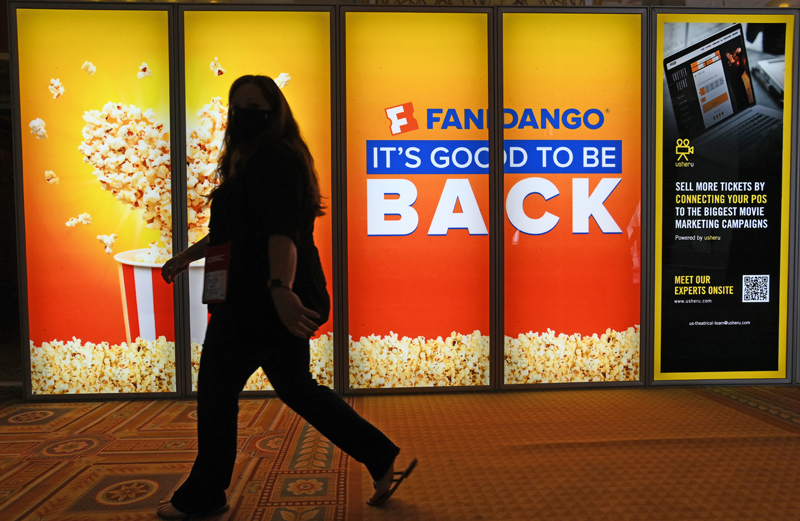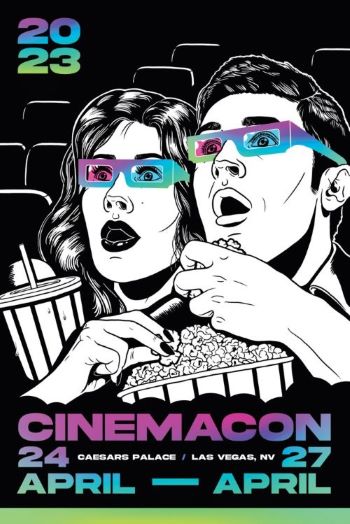
Hollywood and movie theater owners spontaneously embraced the benefits of permanent cuts in cinema-ticket prices industry-wide, despite worries about antitrust issues, at a CinemaCon panel discussion. Whether the industry later pursues shaving ticket prices, which averaged $10.53 in the U.S. last year (see accompanying data table), remains to be seen.
Anecdotal information from past permanent price cuts indicate that they actually lift aggregate boxoffice, despite lower average, by increasing ticket volume. “I think that we need to have a longer-term discussion on pricing strategy as an industry,” said Tim Richards, founder and CEO of theater circuit Vue International. Vue operates 870 screens across the United Kingdom and Ireland.
Richards was one of four panelists discussing ticket marketing and economics at the CinemaCon annual movie theater convention sponsored by trade group the National Association of Theatre Owners. This year, CinemaCon runs April 24-27 in Las Vegas with 3,500 U.S. executives on hand.
Paramount Pictures president-domestic distribution Chris Aronson and Eduardo Acuna, who is president to theater circuit Cinépolis-Americas, agreed there’s a need for cooperation on the belief that price cuts won’t work if big chunks of the industry don’t cooperate.
“Every studio has a different philosophy on pricing,” Aronson said. “And that is a challenge.” Acuna agreed that any patchwork of implementation would fail, saying “there is no doubt this has to be an industry thing.” Acuna’s U.S. circuit emphasizes theaters with restaurant service in auditoriums and is owned a large theater operator headquartered in Mexico.
The notion of competitors’ cooperation prompted a voice in the audience admonishing that the conversation veered into antitrust dangers; the voice apparently was an industry attorney worried about the appearance of price-fixing. Panelists brushed off the caution saying the discussion was general.
Panelists seemed to agree that cinema risks losing family audience from ticket price hikes, and that limited experience around the world indicates ticket reductions are more than offset by selling more tickets.
The family demographic — parents and their kids — is most price sensitive (presumably because young parents are not yet high job earners yet have to pay kids’ expenses). This demographic could be lost to video streamers, because families can cheaply just crowd around TV sets, though they really want occasional nights out. (Text continues.)
Average U.S. Cinema Ticket Prices
| Year | Price |
|---|---|
| 2022 | $10.53 |
| 2021 | $10.17 |
| 2020 | $9.18 |
| 2019 | $9.16 |
| 2018 | $9.16 |
| 2017 | $8.97 |
| 2016 | $8.65 |
| 2015 | $8.43 |
| 2014 | $8.17 |
| 2013 | $8.13 |
Panelists also agreed that the cinema industry has been propping up its economics by raising ticket prices more than the rate of inflation, which is unsustainable in the long run. Another thorny obstacle: Distributor deals to license films often include a minimum guarantee, which sets a floor price that theaters must pay for each ticket sold. Those floor-pricing deals would need to be altered if ticket prices come down.
Meanwhile, the experience is mostly positive from permanent reductions in ticket prices overseas, although in some instances not. There was debate whether short-term price cuts like Cinema Day or a cinema week are a good idea or not. The notion of short-term price cuts stuck some as devaluing full-priced tickets. Speakers also said one-day or one-week discounts should be implemented in slow periods so as not to cannibalize peak boxoffice.
Though not mentioned, the discussion came in an era of industry cooperation because Hollywood distributors recently re-embraced cinema economics and don’t want to become overly dependent on video streamers. Assuming distributors take just over half of a ticket sale, that means Hollywood pockets over $5 for each cinema ticket — in exchange for only a one-time view. That a big cash/small access proposition comparison to licensing movies to video streamers or TV.

The ticketing panel ostensibly intended to examine “National Cinema Day,” an industry promotion offering reduced ticket prices for the first time Sept. 3. Such short-term promotions are common in overseas territories. The discussion was about making Cinema Day an annual event in the domestic market.
Bobbie Bagby Ford, chief operating officer at B&B Theatres, said that she felt Cinema Day was a success. B&B is the fifth largest U.S. circuit with 529 screens in 14 states.
Meanwhile, Aronson was more circumspect than that, saying that there wasn’t enough sharing of information by exhibitors on ticket buyers who participated in Cinema Day. “I do think that it was thrown together a little hastily,” Aronson said. Audience data is necessary to see if any lift attracts non-cinemagoers or prompts light moviegoers to increase attendance over the long run, which are goals.
As for overall CinemaCon event, a highlight is always film distributors hosting splashy presentations for their upcoming film slates. Early on this year, Sony Pictures and Warner Bros. Pictures showed their film slates earliest in a casino auditorium used for Las Vegas entertainment. In all presentations, Hollywood executives uniformly bubble with enthusiasm, forecasting each of their movies will become big hits.
The studio presentations include film clips, movie trailers, and talent involved. In some cases, talent deliver recorded video messages specific to CinemaCon such as “Avatar” director Jim Cameron from on-location in New Zealand and Harrison Ford plugging his new “Indiana Jones” movie. Talent also can appear in in-person. Jennifer Lawrence, Denzel Washington and Oprah Winfrey were on hand; Martin Scorsese sat for an in-person interview during a luncheon on the final day conducted by surprise guest Leonardo DiCaprio.
The gathering also includes a trade show with vendors. Hardware vendors include those selling seats, projectors (sometimes fancy high-tech big screen), audio equipment, food/beverage supplies and collateral recreation such as arcade games. Services vendors offer operational business software, software to handle/manage ticket purchase, software to run customer loyalty programs and engineering services to build/refurbish theaters.
Leave a Reply